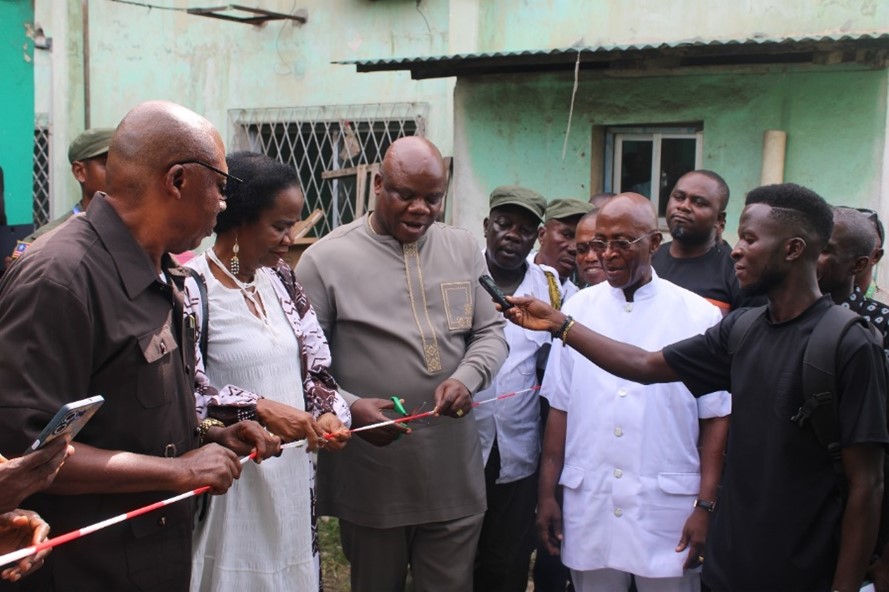Christopher D. Sankolo, Director General of Liberia’s Agricultural Commodity Regulatory Authority (LACRA), has responded to mounting criticism of his administration, asserting his unwavering commitment to serving the Liberian people and improving the agricultural sector. Sankolo’s pronouncements came during a ceremony marking the unveiling and dedication of several significant projects aimed at enhancing LACRA’s operational efficiency. These projects, representing a substantial investment, included a new security booth, two 22-seat coastal buses costing US$78,000, eleven Yamaha motorbikes valued at LRD 10 million, a Toyota Land Cruiser Jeep, and a 100-kilowatt LEC transformer. Sankolo emphasized the importance of these logistical additions to the organization’s transformation and its contribution to the national development agenda. He underscored his focus on delivering tangible results and encouraged others to recognize the positive impact of these initiatives.
Sankolo’s emphasis on tangible improvements and his call for unity stand in stark contrast to the accusations leveled by a group of protesting LACRA staffers. These dissenting employees have voiced concerns about alleged lack of accountability, corruption, and inadequate leadership under Sankolo’s direction. They fear the potential collapse of the institution if these issues remain unaddressed, creating a direct challenge to Sankolo’s leadership. This internal dissent adds another layer of complexity to the narrative surrounding LACRA’s performance and its director general’s effectiveness. The clash between Sankolo’s optimism and the protesters’ concerns underscores the challenges facing the organization.
The dedication ceremony and Sankolo’s statements served not only as a platform to showcase LACRA’s progress but also as a direct response to the criticism he has faced. He reiterated his determination to improve the agency’s performance and contribute to Liberia’s economic growth. He acknowledged the dissenting voices but remained steadfast in his vision for LACRA’s future, emphasizing his commitment to progress and urging unity within the organization. This public display of commitment, coupled with the significant investment in new resources, underscores Sankolo’s effort to project an image of progress and stability amidst the controversy.
Adding further weight to LACRA’s initiatives, Senator Wellington Geevon-Smith, Chairman of the Senate Committee on Agriculture, Fisheries, and Forestry, affirmed the committee’s support for the agency’s development. Senator Smith revealed that a bill proposing the establishment of an Agricultural Bank is currently under consideration in the Senate. This proposed bank, with an initial funding of four million US dollars already secured by the Liberian government, aims to bolster the agricultural sector’s growth and development should the bill be passed. This external support from the Senate committee and the potential establishment of an Agricultural Bank further reinforce the narrative of progress and investment in Liberia’s agricultural sector.
The concurrent dedication of new resources, the public declaration of commitment by Director General Sankolo, and the Senate’s backing of an Agricultural Bank collectively paint a picture of ongoing efforts to modernize and strengthen Liberia’s agricultural sector. However, the presence of internal dissent and allegations of mismanagement create a counter-narrative that cannot be ignored. The interplay of these contrasting perspectives underscores the challenges and complexities inherent in the ongoing efforts to transform LACRA and the broader agricultural landscape in Liberia.
The future of LACRA under Sankolo’s leadership hinges on his ability to navigate these competing narratives. Addressing the concerns raised by the protesting staffers, demonstrating tangible progress towards the agency’s goals, and securing continued support from the government will be crucial to his success. The allocation of significant resources represents a promising step, but the true measure of progress will lie in the tangible outcomes achieved and the extent to which LACRA can fulfill its mandate to improve the lives of Liberian farmers and contribute to the nation’s economic development.


